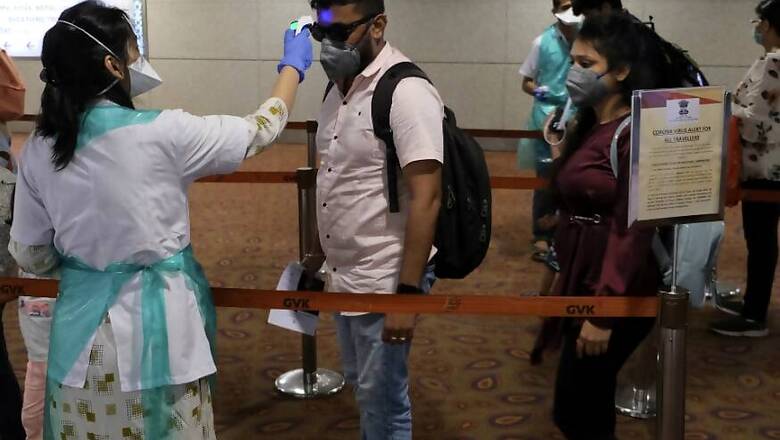
views
New Delhi: Unlike wars that are waged and ended from inside bunkers or offices of democracy, projecting a sense of fast-paced action and damage, a pandemic relatively lives to die a slow death. It takes with it a thousand others, as if like nails to its own coffin – sealed to be forgotten, yet buried to be remembered, later.
The current COVID-19 outbreak, which has already claimed 10,000 lives and over 2,42,000 infections, is wreaking havoc across the world, drawing comparisons with World War II, the 2008 financial crisis, and the 1918 Spanish flu. India is its latest target, with 195 infections and five deaths across 19 states.
As the country closes its borders to contain the spread of the virus in a virtual lockdown, News18 spoke to K Sujatha Rao, former Union Secretary at the Ministry of Health and Family Welfare, seeking answers to questions on policy, preparedness and precaution at the face of this global health crisis.
The government has a containment-first policy by closing its borders. What are the factors contributing to India’s rationale behind this approach?
This is an infection that has not originated in India. It's foreign. So closing of all borders makes sense and in hindsight it seems it ought to have been done effectively from February itself.
Besides, in our efforts to help stranded Indians abroad reach home, we have allowed infection to also sneak in. Testing and quarantine measures didn’t go hand in hand. Coordination with the state authorities of their final destination was also weak.
We may close all borders now but the damage, if any, might have already been done. Only time will tell.
The government claims that community transmission of the disease is yet to start. Hence the push for speedy, diligent and thorough containment. But what about focusing on increasing public health capacity on testing side by side. Do we have enough testing centres? Should we increase their number?
No testing is weak, though it needs to go hand in hand with the other preventive measures. Our testing rate is now 10 per million population, which is abysmally low. The government does not have the luxury of time and appears to be in denial. They are repeating the same mistake we made in the case of HIV/AIDS. India must ramp up testing expeditiously. We have adequate capacity.
Our town and villages are not as enabled as our cities on public health. How ‘real’ is the real picture on the pandemic?
We need to seal off cities and towns and keep our rural hinterland from getting infected. This will need to be accompanied by massive information campaigns so that those coming from rural areas into towns and cities for work know what to do and what not to do. They must not carry infections back.
There has been some recent criticism that Indian companies that are producing testing kits have not been given fast track approvals from the govt via a vis other countries. Why is our health care machinery slow on this?
One possible reason could be related to Intellectual Property Rights. The World Health Organization needs to intervene and make such goods as public goods. They did that in the case of H1N1 vaccine for example. If this is an issue, it must be sorted out quickly. The Drug Controller General of India must answer this.
The government is yet to offer basic information on the capacity of government hospitals. Meanwhile, there is talk of involving private sector hospitals. Is it feasible to replicate this on a large scale?
At current scale of the epidemic, the public sector capacity is adequate. But in case of the epidemic exploding, and it could going by the rapid escalation in the number of infected emerging daily, then there is no option but to involve and partner with the private sector.
Private sector partnerships, however, have to be regulated to ensure they are in accordance with the national guidelines and protocols. Funding mechanisms need to be worked out so that the private sector is reasonably compensated to cover costs, and not make profits.
Should India think of Spain like measure of nationalising healthcare?
Not at all. What and who do we nationalise and why? And who pays for it? These are important questions to think before.
Does having a Standard Treatment Protocol (STP) benefit a pandemic like COVID-19? What is India’s position on this?
STPs don’t vary as per rich, poor, rural or urban. They are based on the causal factors and in this case the aetiology and DNA of the virus. India and four other countries have isolated the virus. That will enable them to come up with the best treatment protocols. Till then treatment will be symptomatic.
The internet is flooded with virus information. How important is its dissemination after an outbreak? Are they only knee jerk reactions?
Disseminating information is the only antidote to irrational behaviour. Never a knee jerk reaction. It is the very foundation of a public health strategy. Information about where is the virus, where it is circulating, among whom, at what levels of virulence etc is epidemiological information that provides the evidence for formulating policy and also for informing the public on how to behave, do and not do.
The Prime Minister’s speech yesterday was all about the need of citizens to be aware, alert and vigilant, but that happens only when information is made available.
Can this pandemic turn out to be an opportune moment for India to cement its interests in delivering a better public health system?
That India’s health system is weak and needs a lot of fixing to be done is well known and documented. There is no justice to answering it briefly. But, the bottom line is under-financing, poor policy attention and a poor regulatory environment.
The politicisation of healthcare as a means to improve funding and infrastructure: are we globally headed in that direction?
We are certainly headed towards health as a global priority. This pandemic will make all countries ramp up and prioritize it. India too will hopefully learn its lessons. Its cruel to say, but it will, only if the damage is severe enough. Its time our politicians understood the damage a little microbe can do.
















Comments
0 comment